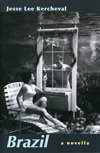Brazil
My copy of Jesse Lee Kercheval’s Brazil smells like Froot Loops, and I don’t mind one bit. The candy-fruit aroma only enhances the sensory snack that this novella serves. More than a snack, really, Kercheval’s short novel delivers dinner and a movie in the same timeframe in which most novels are just passing the hors d’oeuvres.
My copy of Jesse Lee Kercheval’s Brazil smells like Froot Loops, and I don’t mind one bit. The candy-fruit aroma only enhances the sensory snack that this novella serves. More than a snack, really, Kercheval’s short novel delivers dinner and a movie in the same timeframe in which most novels are just passing the hors d’oeuvres.
Paulo Silvas is a parking attendant at Miami’s Royale Palms, a pink-façade art deco hotel in which he has lived ever since his Brazilian father abandoned him and his mother there seventeen years ago. Yet, unlike Paulo, his mother has moved on – back into a single-wide trailer in the hometown in which she grew up. It is July 27, 1988, Paulo’s nineteenth birthday. We readers join him in a spendier bar than he’s accustomed to; the song “Brazil” plays in the background:
Where the songs are passionate,
And a smile has flash in it
Paulo and Claudia sit next to one another at the bar, yet we see each of them through an intermediary mirror. We see her reflection through his eyes. Claudia: thin and rich, wearing “a black dress so simple it had to be expensive and silver earrings like needles. Pretty good, but pretty old, in her forties somewhere.” She imagines he is a pusher. “I want you to treat me like a war,” she says in her Hungarian accent. She means “whore,” but the sentence incites us to leap toward a jumble of images: death, violence, destruction, havoc, guns, soldiers, uniforms, gore, explosions, fire, fear, line-ups, refugees, desperation.
A consummate poet, Kercheval asks us to make many such leaps in this novella, and she uses shards of overheard conversation to poetic effect as well. “My God, Henry, it’s Miami out here,” we overhear a random someone say as Paulo and Claudia exit the bar. Paulo’s inner existentialist agrees: “Transition into the real night was a shock,” he says, interpreting the overheard to mean that, in the real night we sweat, we’re human. We must survive, and we must do so outside the frame of a gilded mirror, outside of an air-conditioned room.
Escaping Miami, Paulo and Claudia launch a cross-country road trip through Florida and north to Wisconsin in search of what’s real. A steady stream of pills, cocaine, caffeine, sleep deprivation, and highway miles make our narrator less than totally reliable, yet we never doubt Paulo’s behind-the-wheel impressions. At Weeki Wachee, Spring of the Living Mermaids, a division of Pepsico, he observes that the theme of the mermaid show is Carnival in Rio: “Claudia squeezed my hand as if she was afraid the sound of the samba might make me cry. Maybe it should have. After all, this was as close as I’d come to Brazil.” For Paulo, Brazil has come to represent home, yet he’s never been there. Thus, the notion of home, just like the notion of Brazil, lives only in his head. Like the song lyrics say:
Brazil
The Brazil that I knew
Where I’d wandered with you
Lives in my imagination.
Jesse Lee Kercheval writes memoir, fiction, and poetry. Born in France and raised in Florida, her poetry books often read like novels, while her novels read like poetry. Her latest books are no exception. Brazil won the Ruthanne Wiley Memorial Novella Award and the poetry collection Cinema Muto won the Crab Orchard Open Selection Award. Cinema Muto pays tribute to an Italian silent film festival, to silent film and film in general. The author herself describes it as, “Also about life, death, food, violence, sex – all the usual good poetic things.” All of the above make cameos in Brazil, too, as do the blurred concepts of love, family, and home. Kercheval incites us to ask, where is the real America, who is our real family, what makes a real home, and what makes home real?
On the road to Wisconsin, we learn that the enigmatic Claudia’s quest is similar to that of her young, half-Brazilian driver. She too is attempting to gain her sense of place in the world – her family, her home. We learn she was once abandoned in Wisconsin by the father of her baby, Sophia, a baby to whom she gave birth and then gave up for adoption. The house in which she gave birth, and in which the teenaged Sophie still lives, turns out to be Paulo’s dream house: “white, two stories with black shutters and trim, except instead of being in some suburban neighborhood, it was in the middle of a pasture.”
While in Wisconsin, we get a dose of all of Kercheval’s “good poetic things,” including one of Paulo’s more brilliant insights: “But I wasn’t bored. A burger I could have at McDonald’s, but with fries. Only people who ate at home got Tater Tots.”
Alas, Paulo’s dream, as well as the mother/daughter reunion, disintegrates when Claudia pulls a gun on the adoptive mother after Sophie herself declines Claudia’s invitation to live with her in Florida. On their way out of Wisconsin, Paulo and Claudia make one last stop on their road trip. Though a near-death tragedy unfolds, we nevertheless take away a sense of hope for both the Hungarian émigré and her half-Brazilian driver. Brazil reminds us that existence is a wild, spinning carousel, perhaps at Carnival, a fruit-sweet scent sambaing through the dizzying air. Better to have someone to hold onto sharing the ride.





